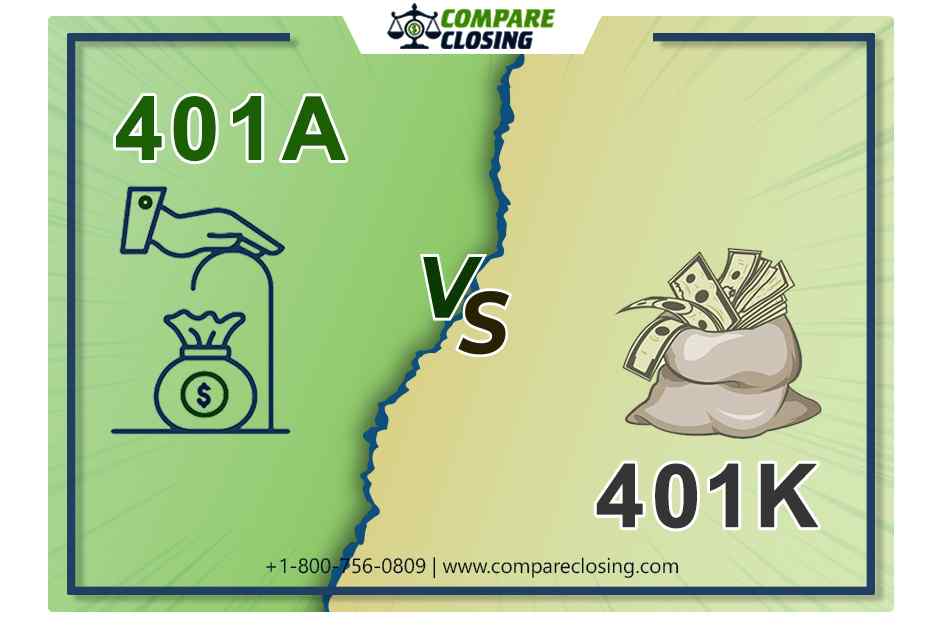Table of Contents
- What Are Netting Escrows & How Does It Work?: The Best Guide - January 2, 2024
- The Secret About Prescriptive Easement: Top Guide 1 Must Know - December 4, 2023
- About Home Equity Loans In Texas And How Can One Obtain It - November 27, 2023
The Difference Between 401A vs 401K
401a plans and 401k plans are the two primary types of defined contribution retirement savings plans that are offered by employers.
The basic difference involves the employers who offer the plan. The plan gets their names after Section 401 of the United States Internal Revenue Code, which defines them.
The core differences between the 401a vs 401k plan are first in the types of employers who offer them and then in various key provisions as for contributions and investment options.
Initially, most workers depend on their monthly retirement contributions income like Personal retirement savings and social security plans.
Now most employers have stopped using pension plans and are replacing them with workplace retirement savings packages like the 401a and the 401k.
401a and the 401k both plans are looked at as sponsored retirement savings plans for the workplace, at times they are interpreted as tax codes.
Using either of them will mainly rest on the type of employer offering them, also on the events and situations surrounding the arrangement with the workers.
What is a 401A Retirement Savings Plan?
401a plan is offered by Government and Non-profit Organizations. They can be cited as a money-bought retirement package offered mainly by NGOs, government establishments, and educational institutions.
The 401a is customized and extended as an incentive to keep a few employees loyal to the organization.
Even though it is an incentive, the monthly contribution to this plan is usually decided by the employer. Even if the employee contributes to the 401a, additional contributions to the plan are also made by the employer.
The employer of the beneficiary of the 401a will schedule the contribution into the 401a, and will also schedule the payment whether it needs to be monthly, quarterly, bi-annual or annual contribution of the contributions.
If the employee leaves the organization, then they can withdraw by rolling the contributions over to another qualified retirement savings plan or choose to buy an annuity with it.
Participation for all employees is made mandatory for most organizations offering the 401a. And so are the employer’s contributions but employers have the power to control the amount contributed to the 401a.
The eligibility of an employee taking part in this retirement plan will normally be determined by the employer.
One of the main characteristics of the 401a is that it can be contributed before or after-tax deduction.
The employee can withdraw part of this investment fund in case of emergency, or due to some unforeseen events, and the amount withdrawn will be liable to income taxes.
If there are early withdrawals from your 401a retirement plan they are subject to penalties. If an employee withdraws from their 401a before they attain the age of 60 there is a penalty. In most cases, 59 ½ is the age limit at which an employee is advised to withdraw.
What is the 401K Retirement Plan?
The 401k savings retirement plan is mainly offered by the Private sector.
The eligible employees who qualify can decide to contribute voluntarily. when contributing to this retirement plan, normally the employers have options.
If the employee does not have the financial strength to contribute fully then they can match a certain percentage of the employee’s contributions.
The 401k is pre-taxed before the contributions are made so it is not like the 401a that can be contributed before or after tax.
One of the main advantages of the 401k is that at any point an employee can change the amount he or she contributes – which is not available in the 401a. Another advantage is, the contributions to 401(k) come with some tax advantages.
For example, an employee can put back a portion of his or her wages into the 401k plan just before taxes are applied. This is the reason, the employees can determine the volume of their pre-tax contributions, so they can save money in the long run.
If an employee does not withdraw from their 401k until after retirement, then such withdraws are completely tax-free.
Only the employee makes monthly contributions into the 401k from their paycheck. Even if the employer may offer an alternative plan it is not necessary for the employer to contribute to the 401k.
And in most cases the employer can also decide which investment options are available to the employees, there are up to 30 investment options available.
These many 401k investment options to employees have resulted to be quite complex and confusing. One of the main drawbacks of the 401k is, each time the owner withdraws funds they are taxed.
Major Differences Between 401a vs 401k
401a plan is offered by public employers and NGOs, whereas the 401k plan is offered by private employers. Participating in a 401k is not compulsory but 401a participation is mandatory.
An employee can dictate how much they want to contribute out of their paycheck with the 401k, while the 401a is always decided by the employer.
An employee has presented the chance to choose from a wide range of investment options in 401k, on the other hand, the 401a gives more muscle to the employer as to which investment options they want to offer to their employees.
The 401a has limited investment options so it reduces the risks of investing in certain products.
Eligibility Differences for the 401a vs 401k
In terms of eligibility, the 401a and 401k differ. According to the section 410a (1) Act of the IRC (Internal Revenue Code), to be eligible for both the plans, the employee must be at least 21 years old or must have fulfilled a certain level of the company’s sponsoring the retirement plan.
The minimum length of tenure completed for an employee to qualify for a 401a is 2 years and the minimum for the 401k is 1 year.
The Minimum and Maximum Contributions in 401a vs 401k
Another difference between both the retirement plan is – to the 401a plan an employee can contribute a maximum of $18,500 annually, while in the 401k plan the maximum of $55,000 annual contributions is allowed.
That is the reason, why the volume of investment in the 401k is much lower than 401a, this also means that a 401a beneficiary may have more disposable funds after retirement than the beneficiary who started the 401k contribution around the same time.
Conclusion
Whether one chooses the 401a or 401k, the secret to maximizing your income will depend on many factors.
Resist the temptation of withdrawing from the funds before retirement.
The funds accrued on the 401a or 401k retirement for several years can secure your future financially, particularly after retirement.
Develop a plan, along with analyzing the differences between both the 401a and the 401k plan.
With the help of a retirement calculator, one can work out how much you can save over a period of time.
Amanda Byford
Amanda Byford has bought and sold many houses in the past fifteen years and is actively managing an income property portfolio consisting of multi-family properties. During the buying and selling of these properties, she has gone through several different mortgage loan transactions. This experience and knowledge have helped her develop an avenue to guide consumers to their best available option by comparing lenders through the Compare Closing business.





